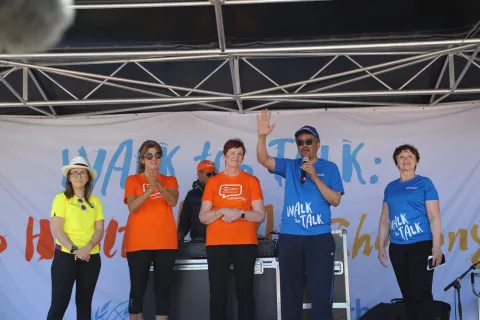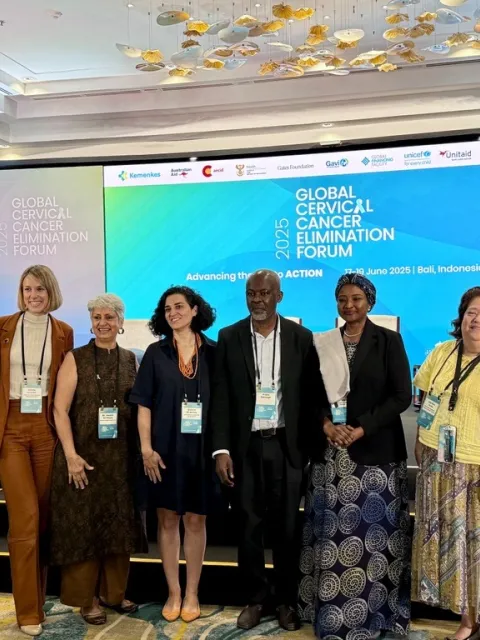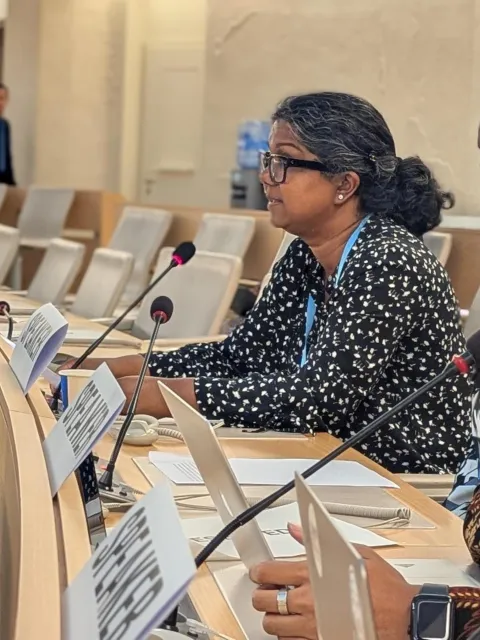A call to action to eliminate cervical cancer globally
19 May 2018 | Geneva, Switzerland – UICC was proud to join United Nations (UN) agencies in organising a milestone meeting at World Health Assembly (WHA), where WHO Director General, Dr Tedros Adhanom Ghebreyesus, made a call to action for the elimination of cervical cancer globally.

A bold new call to action by Dr Tedros
UICC was proud to collaborate with group of UN agencies and leading international organisations to organise a milestone meeting on cervical cancer at World Health Assembly (WHA) . Following on from the adoption of the 2017 cancer resolution, UICC has been working with partners to help build momentum for it implementation, focusing particularly on the opportunities for eliminating deaths from cervical cancer.
The discussions included engaging contributions from a number of Ministries of Health who discussed their countries experiences and challenges in preventing and treating cervical cancer nationally, as well as high-level participation by UN leaders and global advocates for women’s health and cancer control, including Michelle Bachelet and UICC's own President Sanchia Aranda and President-elect Princess Dina Mired. Check out the agenda here.
This is the first time that a Director General of the WHO has put their own voice behind cancer control efforts in such a strong and concrete manner. Speaking during the plenary and side events at the WHA, Dr Tedros emphasise that the global health community has all the ingredients for success and that there is a movement growing behind this goal which measures success possible.
Priority topic at DGs plenary speech and throughout the World Health Assembly
Dr Tedros reiterated that he is proud to launch a call to action on the elimination of cervical cancer during the first DG plenary speech of the week stating - “we have all the ingredients for success”. The WHO DG explained the inclusion of global elimination of cervical cancer as one of a series of new initiatives in his 5-year global program of work “health security and Universal Health Coverage (UHC) are two sides of the same coin. That’s why WHO has to act with a sense of urgency in everything it does as every day is a question of life and death”.
In addition, Member States were invited to watch the key moments of the launch event, review WHO materials and ask questions at a pop-up information booth throughout Friday.
A WHA Podcast
In the short podcast below leaders representing different stakeholders in the cancer community discuss first thoughts, welcoming the stamp of approval from WHO leadership for a set of proven tools for implementation and scale up of desperately needed services.
Please watch and listen to our podcast – reactions to the call to action to address the social inequality of access to cervical cancer prevention here below:
Dr Neerja Bhatla, Dr Sharon Kapambwe, Dr Ophira Ginsburg and Julie Torode
Summary:
- We are starting to see a break in the taboos about talking about the cervix and symptoms, we now have the opportunity to remove the stigma around these preventative interventions and cause a change in mindset, speaking to the whole community about the protection and sense of wellbeing from HPV vaccination and at least a once in a life-time screen
- The connectivity between community healthcare and the treatment centres need to be assured, navigating women with a positive screen through the system, but it is also about making the community to become an active player, particularly working through community leaders and bringing information and services as close to the community as possible.
- We do need a change in mindset from the healthcare providers too, their role does not start when disease is present, they too need to embrace their health promotional role, perhaps through designated integrated health services.
- We need a robust technical assistant mechanism, building the capacities for dealing with early cervical cancer such as surgery a simple hysterectomy, but also palliative care, so that the care continuum is secure.
- Building cross-sectoral partnerships at all health service levels and find local support to ensure they are financially sustainable.
- We need to drive the investment case at national level, ensuring cost is not a barrier to those in most need.
- We need a global mapping of where countries are, providing the right help in a phased approach reacting to where they are, but leaving no one behind.
- We also need to map and engage all industry partners to help drive the affordability for all countries.
- Building communities of best practice to learn rapidly from each other, to drive scale up to national services.
- We need to wrap a strong research agenda around the implementation to learn and be effective in all implementation efforts.
- We need coordinated advocacy at global, regional and national levels to generate trust, collective action and utilisation of services with robust monitoring and evaluation to check and challenge on those not using the services as well as those being lost along the way, to ensure maximum learning as efforts progress.
International Federation of Gynaecologic Oncology speaking out
In a FGIO hosted side event Dr Anne Kihara, President-Elect of the African Federation of O & G, emphasised the devastating impact of HIV and HPV co-infection, especially in Africa with younger and younger women presenting with cervical cancer.
FIGO also took the opportunity to extend a distinguished achievement award to WHO DG Dr Tedros, recognizing the momentum that his leadership brings to the goal to eliminate cervical cancer globally.
WHO DG Dr Tedros receiving a recognition award recognising the momentum that his leadership brings to the goal to eliminate cervical cancer globally with on the left Prof CN Purandare, President, FIGO and on the right Prof Seija Grenman, Vice President, FIGO
Dr Tedros says “I can see the vibe since making the call to action on eliminating cervical cancer, people are ready to do! Many countries are paving the way. We are creating a movement, I think it’s possible!”
The end of cervical cancer
Accompanying the announcement Unitaid launched call for proposals to help eliminate cervical cancer
Unitaid is seeking to fund smart, innovative projects that will help eliminate cervical cancer, a leading cause of death in low- and middle-income countries, particularly among women with HIV. Read the full press release here.
UICC will be working with UICC members, other global partners, and UN agencies to maintain the momentum of these exciting new announcements.
Have your say
What are the “To Dos” of a new global partnership to eliminate cervical cancer?
UICC will be working with UICC members and UN agencies to maintain the momentum of these exciting new announcements. We want your perspectives to shape the planning steps over the next few months.
Last update
Tuesday 28 February 2023
